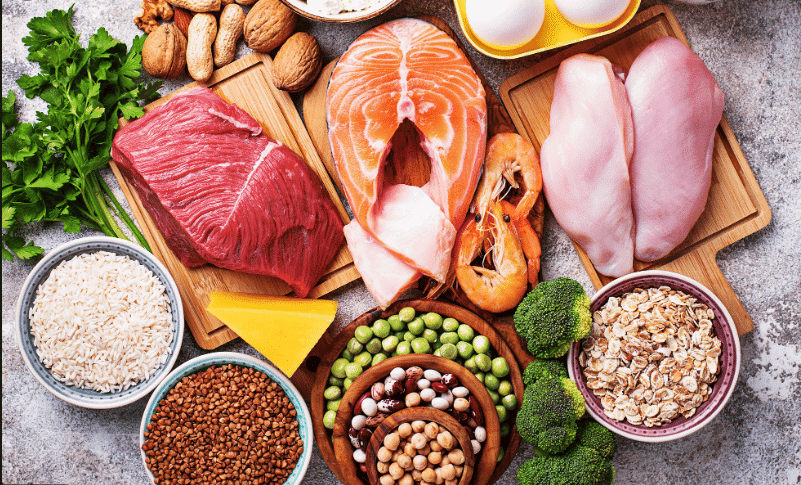Nutrition for Performance
Following on from the content, which was created in January during the BaseLevel2NextLevel series, In February I decided to focus more on how we can use nutrition in order to benefit performance now that we understand the basics. I called this series Nutrition4Performance. This article is an outline of the topics which were covered throughout these videos and how the concepts and the recipes can be used in order to boost performance.

Over these few weeks, I covered:
-
- Using high performing areas as a reference
- Satiety
- Homemade Protein Bars
- What food provides energy?
- Plan your week.
- Pre-Match Meal
- Anyone can be a high performer.
- Maintaining hydration during competition
- Monster Energy Drinks
- Clarity in your injury can reduce frustration.
- Speedy Recovery Smoothie
- Sports drink vs water
- Foods to avoid for exercise.
- Daily Habits you never regret.
- Creatine and Performance
- Half time strategy for hydration
- Body Recomposition
- Fresh or Frozen fruit and veg.

- Using high performing areas as a reference
It is important to use areas of your life that you perform well in as a model for enhancing another, such as your nutrition and food choices. What systems and plans are in place for any area where you excel? Can you improve your lifestyle and health using that strategy by being more self-assured, reliable, and effective?
- Satiety
A half-can of beans contains almost 10 g of fiber, or 1/3 of your daily requirement. This is a great example of a food which is rich in protein and fiber and will give you a higher feeling of fullness and satiety for the day.
- Homemade Protein Bars
Mix together peanut butter, honey, and oats very well. Once mixed add some mixed nuts and seeds. Add 3 scoops of protein and a drop of milk. Place on a baking tray and pack it down. Leave to set for 2 hours and then cut up into small individual bars and enjoy and a breakfast or snack!
- What food provides energy?
What happens in the kitchen directly impacts your performance on the pitch. The body receives its energy from stored forms of carbohydrate within the body called glycogen. How do we increase our glycogen stores? – Carbohydrate rich diet with foods such as rice, pasta, oats, fruit. These foods can be combined together to create high carbohydrate meals which ultimately will fuel performance.
- Plan your week.
Plan your energy intake depending on days of exercise. Look at your carbohydrate intake for each day depending on the activity level of the day. Energy needs should align with your planned day. Rest day 3g of carb per kg body weight, Exercise day 4g of carbs per kg/bw, Fueling up 6-7g of carbs per kg of bw. Recipes which are needed to hit these targets can all be taken from the daveynutrition website.
- Pre-Match Meal
A lot is made of the pre match meal however it is really the final piece of the jigsaw. 3-4 hrs before this gives your body adequate time to digest the food and it can therefore use it as fuel for performance. The meal should be a low fat, moderate protein high carbohydrate meal. Your stomach should feel empty when you head out to perform.
- Anyone can be a high performer.
all it takes is knowing the behaviours and practices that enable you to do so. maximum vigour and focus to excel at your daily tasks. a few minor things to consider. Be prepared Have water ready, clean coffee cup, bringing snacks to work/college. Overnight oats, collagen shot. Live the high-performance lifestyle with clarity and consistency.
- Maintaining hydration during competition
Hydration and maintaining circulating energy levels and blood sugar is the most important element of nutrition during high intensity exercise. So how can you maintain these hydration levels in a high intensity sport with little breaks in play such as GAA or Soccer. I advise to keep fluids (sports drink) close to the side-line, get a couple of mouthfuls during break in play, whenever you can take them. The sports drink you want to be consuming should be a 6% cab solution containing sodium & potassium.
- Monster Energy Drinks
Although it seems like everyone is obsessed with this product, can the formula withstand scrutiny? There is a significant amount of caffeine in there, and caffeine is a stimulant and performance enhancer. But what else? Simply put, the ingredients lack adequate scientific backing, so I wouldn’t suggest using them to any of my athletes.
- Clarity in your injury can reduce frustration.
I have learned a lot from my recent knee injury. Usually I would focus on recovery myself, strengthening the muscles around the area. If the injury is still sore I may see a physio however I would continue to rehab the injury myself not exactly sure 100% what the problem is. Eventually I decided to get scans, see consultants, and receive proper examination from experts. This gave me extreme amounts of clarity and helped me implement a sustainable plan.
- Speedy Recovery Smoothie
A blender is a key part of your toolkit for both early morning sessions and late evening sessions. This recovery smoothie from my book works perfectly.
- Drop of milk
- Blueberries
- Greek Yogurt
- Peanut butter
BLEND!
- Sports Drink vs Water
Water should be consumed most of the time and leading up until exercise. High intensity exercise requires a sports drink to maintain circulating energy levels and provide body with electrolytes. A low intensity run or gym workout, where you are not losing large amounts of sweat water is fine. However if it is a high intensity exercise routine where you are losing lots of fluid through sweat you need a sports drink. The amount of time you should be consuming a sports drink is really small.
- Foods to avoid for exercise.
Onions, garlic, chickpeas, or lentils can cause gut issues, foods high in fiber should be avoided. spicy foods such as peppers should also be avoided. This however is all person specific and may impact some people more than others. Make sure to look at your pre performance meal and notice any red flags which may irritate your gut
- Daily Habits you never regret.
These are habits to do daily, some which are unrelated to nutrition, that keep you performing at your best and that you will never regret after you have done them. Hydration, flossing, writing a note, or thought down , having 3 pieces of fruit, reading a page of a book, doing exercise specific for you, making a call to a friend, taking 3 deep breaths, making your bed, cooking a new recipe or one that you like.
- Creatine and Performance
Creatine is an effective supplement that supports strength power and muscle mass development however you have to be training at a level which requires the use of it. Nutrition and training needs to be on point before using it. 2-3 grams a day is the recommended daily dose. It is not some sort of magic potion!
- Half time strategy for hydration
There are many misconceptions around this concept such as eating oranges and jaffa cakes! The most important strategy for half time is ingesting a Sports Drink. This sports drink should be easily available and ready to go. Consume it as early as possible. 20-30g of carbs ingested, small mouthfuls. 500ml of a sports drink in total
- Body Recomposition
This is a term used for cutting body fat and building lean mass at the same time. It is a lot more difficult and much less efficient than focusing on cutting or bulking. If you want to go up a kg of muscle and down a key of lean mass, you need to still be in a Calorie deficit, your protein targets on point, your sleep on point and managing your stress effectively.
- Fresh or Frozen fruit and veg.
Frozen is helpful when the food is out of season in the winter months to add into your smoothies and other recipes. Fresh fruits and veg are obviously preferable however frozen food can be also used to the same degree.
For more information on these topics, visit our blog page or watch the videos over on my Instagram page









